TODAY’S READING FROM THE ONE YEAR BIBLE- SETTLING FOR LESS THAN WHAT GOD HAS PROMISED.
MARCH 21- Numbers 32-33:39; Luke 4:31-5:11; Psalm 64:1-10; Proverbs 11:22
NUMBERS 32- HAVE YOU SETTLED FOR LESS? THE TRANSJORDAN COMPROMISE  In Numbers 32, the Reubenites and Gadites settled for less than what God promised. All twelve tribes had traveled with the goal of settling in the Promised Land for 40 years and were on the brink of possessing it when the Reubenites and Gadites decided it would be better to settle on the grazing fields east of the Jordan River. They stopped short of possessing the land that was promised to them! They had driven the enemy out of the lands of Jazer and Gilead and decided that, according to their own minds, the location suited their needs.
In Numbers 32, the Reubenites and Gadites settled for less than what God promised. All twelve tribes had traveled with the goal of settling in the Promised Land for 40 years and were on the brink of possessing it when the Reubenites and Gadites decided it would be better to settle on the grazing fields east of the Jordan River. They stopped short of possessing the land that was promised to them! They had driven the enemy out of the lands of Jazer and Gilead and decided that, according to their own minds, the location suited their needs.
What was wrong with that? It appeared to be right for their business. (The land was ideal for their livestock.) It appeared to be in the best interests of their family’s security. (The land had already been conquered and they would build fortified cities to keep their children out of harm’s way, far from the Canaanite battlefront.) How could a decision which looked most promising for business and family be wrong? Because it fell short of what God had promised. They were called to be the people of the covenant and to live in the land that God promised to give them. Their destiny was to rest in the victory that God would give them as an inheritance and not settle for less.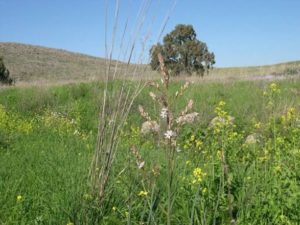
God has the big picture in view for our lives. Our stories are part of a larger story. He loves us and has our best interests in mind. He also knows what is best for our families, our businesses, future generations and much more. He wants us to possess what He has provided for us. This cannot happen when we compromise our obedience to His revealed will and make decisions simply based on our sense of what seems right in our own eyes.
However, God is sovereign. He knows what is best and in His Word we find “His will of command”. But He is also gracious. We also know that He works everything according to His will (His will of decree, sometimes referred to as His permissive will.) His purposes will not be thwarted. He knows our weaknesses. He understands our sinful hearts and recognizes our poor decisions and their repercussions. He works with those decisions in His permissive will, maintaining His sovereignty, showing mercy to whom He will show mercy and compassion on whom He will have compassion (Exodus 33:19; Romans 9:14). He allows things that He does not like. He lets the tribes of Reuben and Gad settle on the east side of the Jordan after the conquest of Canaan. (We learn that half the tribe of Manasseh will join them.)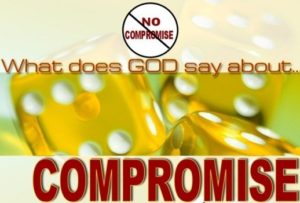
What about us? Have we compromised our obedience, settling for less than what God has promised? Are we afraid of future spiritual battles that come with fresh obedience to God? Do we opt for what looks suitable solely on the basis of our own needs? Are we leaning on our own understanding of what is best instead of trusting God for what He said is best?
After 40 years journey, two of the tribes are wanting to stop short of the finish line! God has told this generation that victory was within reach, but they were opting for something far less. But it looked comfortable, convenient, and less threatening.
Comfort and convenience are often faith killers. We can easily build our little fortresses to protect ourselves from taking risks. We may have an eye for our business, but not necessarily for the glory of God. We can build a shelter for our little ones, but on the wrong side of the river. We rationalize that we don’t want our children to be exposed to the real spiritual battle, yet they become further casualties of our compromise.
We have learned that there are two wills of God. There is “the will of command”— His declared will. Let us have ears for it. Then there is “the permissive will”—which includes humans suffering the consequences of their disobedience. In this regard, two apparently contradictory truths are held together in tension- God is sovereign and human beings are responsible.
Let us not give in to the rationalizations of our own human reasoning that put the interests of idolatries over those of the Living God. Faith comes by hearing what God has made known in His word.
The Reubenites and Gadites, in disregard for the ‘will of command’, make their plea: “Do not take us across the Jordan!”
Self-interest and self-preservation have become their cloud by day and fire by night.
Moses rebukes them on at least 8 counts:
- Their failure to trust God for what He promised– victory in and possession of the promised land.
- Their unwillingness to identify with God’s purpose in the conquest of Canaan (representative of the spiritual battle in which we are to resist and subdue the enemy in the Name of the Lord).
But Moses said to the sons of Gad and to the sons of Reuben, “Shall your brothers go to war while you yourselves sit here? (Numbers 32:6; NASB)
- Their failure to put the interests of their brothers above their own (Their decisions only took into account their own felt needs.
- Their failure to recognize the discouraging impact of their actions upon others. (They were setting the tone for spiritual compromise, self-interest and discouragement). Our own lack of full participation in God’s purposes has a demoralizing effect on the people of God.
- They failed to learn the lessons of their past. Moses reminds them that their fathers were destroyed in the wilderness because of their unbelief that they could defeat the enemy and settle in the Promised Land.
- They failed to follow the examples of those who fully followed the Lord (Caleb and Joshua).
- They failed to understand God’s estimation of their behavior. God saw them as a “brood of sinful men” (Numbers 32:14). Notice as you read the New Testament that John the Baptist and Jesus are not afraid to let people know how God sees them, using similar words:
7 But when he saw many of the Pharisees and Sadducees coming for baptism, he said to them, “You brood of vipers, who warned you to flee from the wrath to come?
Matthew 3:7 (NASB)
34 “You brood of vipers, how can you, being evil, speak what is good? For the mouth speaks out of that which fills the heart.
Matthew 12:34 (NASB)
33 “You serpents, you brood of vipers, how will you escape the sentence of hell? Matthew 23:33 (NASB)
- Failure to pursue the revealed will of God that will bring chastisement upon all the people.
15 “For if you turn away from following Him, He will once more abandon them in the wilderness, and you will destroy all these people.” Numbers 32:15 (NASB)
The Reubenites and Gadites hear Moses’ rebuke and repent to the degree that their fighting men will cross the Jordan and go to the front lines with the rest of the people of Israel. They promise that they will not return to their homes on the east side of the Jordan until every one of the sons of Israel has possessed his inheritance.
However, their compromise is displayed in verse 19:
19 “For we will not have an inheritance with them on the other side of the Jordan and beyond, because our inheritance has fallen to us on this side of the Jordan toward the east.” Numbers 32:19 (NASB)
How often do we choose for ourselves instead of choosing what God has chosen for us, His chosen people?
Moses accepts this compromise. We cannot help but wonder why Moses fails to do what we have seen him do consistently in the Book of Exodus and Numbers. He fails to speak to the Lord. We do not have any record of the Lord speaking in this chapter.
But Moses makes a reference to one aspect of the Lord’s role in this: The LORD hears the promises we make.
20 So Moses said to them, “If you will do this, if you will arm yourselves before the LORD for the war, 21 and all of you armed men cross over the Jordan before the LORD until He has driven His enemies out from before Him, 22 and the land is subdued before the LORD, then afterward you shall return and be free of obligation toward the LORD and toward Israel, and this land shall be yours for a possession before the LORD. 23 “But if you will not do so, behold, you have sinned against the LORD, and be sure your sin will find you out. Numbers 32:20-23 (NASB)  The Lord knows whether our conduct is in accordance with our promises. What is hidden to others is not hidden from God.
The Lord knows whether our conduct is in accordance with our promises. What is hidden to others is not hidden from God.
NUMBERS 33- 33 CAMPING SITES
Israel, whom God called His Son, was led by the Spirit into the Wilderness after the exodus for 40 years of testing. In our New Testament reading we see God’s Son, Jesus, led into the wilderness for 40 days. Where Israel demonstrated unbelief, Jesus demonstrated perfect faith; a perfect disposition of dependence upon God and trust in every word that proceeded out of His mouth. He expressed perfect obedience to the will of God the Father.
It is interesting to observe that Jesus had a 33-year journey tabernacling among us. The children of Israel had 33 recorded locations at which they camped.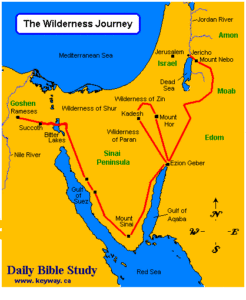
Summary of the Wilderness Journeys -33 campsites are recorded
Numbers 33:5-15 – This is the itinerary of the Israelites in Exodus 23:37-19:2.
Numbers 33:16-17 This is the itinerary of the Israelites in Numbers 10-11
Numbers 33:18-29- This is the itinerary of the Israelites mentioned only here.
Numbers 33:30-34- This is the itinerary of the Israelites in Deuteronomy 10:6-7.
Numbers 33:37-39 This is the itinerary of the Israelites in Chapters 20-25.
NEW TESTAMENT READING: Luke 4:31-5:11
An envelope with only three or four lines of information can precisely pinpoint the exact place where you live for the postman to deliver the post. A good historian supplies enough information to precisely pinpoint both the place and the time of the events described. In this regard, Luke shows himself to be a top-notch historian!
Luke lists seven historical figures who are in their prominent offices at the same time so that anyone who studied history could pinpoint the time of John the Baptist’s ministry.
Luke 3:1-2 1 Now in the fifteenth year of the reign of Tiberius Caesar, when Pontius Pilate was governor of Judea, and Herod was tetrarch of Galilee, and his brother Philip was tetrarch of the region of Ituraea and Trachonitis, and Lysanias was tetrarch of Abilene, 2 in the high priesthood of Annas and Caiaphas, the word of God came to John, the son of Zacharias, in the wilderness. Luke 3:1-2 (NASB)
He also provides the age of Jesus and his genealogy going back to Adam through the line of Mary (while Matthew traced the line of his legal foster father, Joseph in the first chapter of Matthew’s gospel). Mary’s name was probably not mentioned due to the tradition of men being named in genealogies, although Matthew named four of them. Both Joseph and Mary were in the family line of David and the genealogies prove that Jesus had the legal right to David’s throne.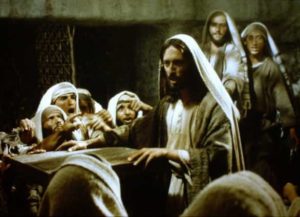
Jesus’ public ministry began in Galilee. It was a custom to have guests and assigned readers and teachers of Scripture gather in the synagogues. Jesus began his ministry reading the Scripture in the synagogue in his hometown of Nazareth, announcing the terms of Jubilee, the release of the captive, the indebted and oppressed, and recovery of sight to the blind.
Luke records only one sentence of Jesus’ teaching on Isaiah 61.
21 And He began to say to them, “Today this Scripture has been fulfilled in your hearing.”
Luke 4:21 (NASB) 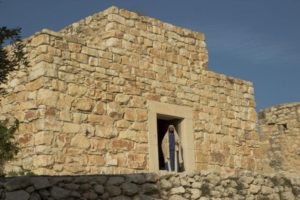
He also records only one sentence of Jesus’ popularity as a teacher in Nazareth.
Luke 4:22 22 And all were speaking well of Him, and wondering at the gracious words which were falling from His lips; and they were saying, “Is this not Joseph’s son?” (NASB) 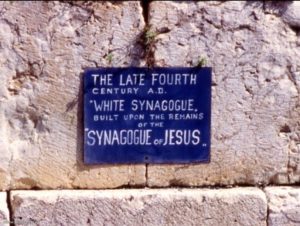
His popularity was only one sentence long in Nazareth. As soon as Jesus attacked their ethno-centricity and highlighted that God sent His servants to do miracles for foreigners rather than locals, His unbelieving covenant partners, they were outraged and wanted to kill him! (Luke 4:23-30)
He then went to the city of Capernaum (the fishing village hometown of Peter, Andrew, James and John) which is on the shore of the Sea of Galilee.
I have had the privilege of visiting the sites of the synagogues of Nazareth and Capernaum. We are told that they taught from the sitting position. I was happy to try the seat of the synagogue at Capernaum. 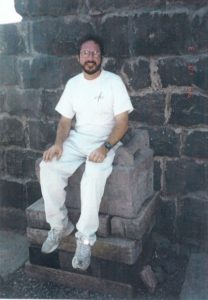
Jesus taught with authority in the synagogue. That authority was recognized by not just the people of Capernaum but the demons who screamed out from a man in the synagogue service: “Let us alone!” The demons were being tormented by the truth that they heard. They anticipated their doom.
“Have you come to destroy us?”
As we saw in the Gospel of Mark, Chapter 1, the first to confess Jesus as the Holy One sent from God, the only human being without sin, and the Son of God, were the demons (Luke 4:34; 4:41). And Jesus was not going to give demons the privilege of witnessing to these facts, nor would He trust His testimony to them. He demonstrates His authority over demons by exorcizing them and silencing them.
Jesus demonstrates His authority over unclean spirits, spirits of infirmity. He demonstrated ‘the kingdom of the age to come’ in His authority over sickness (healing Peter’s mother-in-law and multitudes in Galilee).
Jesus preaches outdoors and devises a brilliant way to speak and be heard by getting into Simon Peter’s boat and moving it as a portable pulpit where His voice would be amplified by the lake’s water surface.
When He finishes speaking, He demonstrates His authority over nature by commanding a miraculous catch of fish in an area where Peter had previously caught nothing. This is what Jesus wants us to know: That which is not possible with man, is possible with God.
The catch is so great that the nets begin to break and the boats to sink (overwhelming their natural capacity.) This is eventually contrasted with a similar miracle AFTER the Resurrection in John 21 in which the nets do not break and the boats do not begin to sink. It is a picture of the supernatural capacity God puts within us as we identify with Christ and His death for us on the Cross. We become partakers of the Resurrection Life of Jesus as we are recommissioned in Him!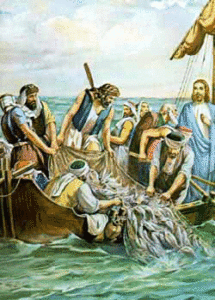
Peter is humbled by the display of God’s grace in the person of Jesus and falls down at Jesus’ feet saying, “Depart from me, for I am a sinful man!” (Luke 5:8)
In Luke 5:10, Jesus gives His first commissioning of Simon Peter (and fellow fishermen, John, James and Andrew) “Do not fear, from now on you will be catching men.” Luke 5:10 (NASB).
11 When they had brought their boats to land, they left everything and followed Him.
Luke 5:11 (NASB)
TODAY’S READING FROM THE BOOK OF PSALMS: PSALM 64:1-10
“We have nothing to fear but fear itself.” This is what Franklin Delano Roosevelt said in the light of the pessimistic economic forecast of his day.
The Psalmist asks God to preserve his life from “dread of the enemy”.
Psalm 64:1 (NASB) 1 Hear my voice, O God, in my complaint; Preserve my life from dread of the enemy.
The Psalmist was aware of his enemies’ dreadful strategies. They plot against him, fire malicious words, harbor bitter resentment, and search out reasons to discredit his motives and actions (v.2-6).
But he chooses to focus on the righteous work of God (verse 9), the finished work of Christ. The Lord provides a refuge for those who trust in Him.
Psalm 64:10 Let the righteous rejoice in the LORD and take refuge in him; let all the upright in heart praise him!
PROVERBS 11:22 DISCRETION- Don’t leave home without it!
“Like a gold ring in a pig’s snout is a beautiful woman who shows no discretion.” Proverbs 11:22 (NIV) 
PRAY FOR THE NATIONS: BURKINA FASO (from the Prayer Guide: Operation World p. 177-178)
Geography
Area: 274,200 sq. km
A landlocked country of the Sahel. Prone to drought and famine.
Population: 16,286,706 Annual Growth: 3.45%
Capital: Ougadougou
Urbanites: 20.4%
HDI Rank: 177 of 182 (UN Human Development Reports 2009)
Answer to Prayer
The increase of Christianity, particularly evangelicals, has been sustained over several decades. The growth of the early 1990s may never be equaled. Nonetheless evangelicals grew from 10,000 in 1960 to 1.44 million in 2010.
Give praise for the vibrant AoG family of churches, with a strong missionary vision and claims of over one million affiliates. A significant minority of these are converts from Muslim backgrounds.
Challenge for Prayer
The spirit world is very real in Burkina Faso, where, as the saying goes, the population is “50% Muslim, 20% Christian and 100% animist”. The power of the occult has yet to be decisively challenged and broken in many peoples of Burkina Faso. Few countries in West Africa are more dominated by idolatry, fetishism and secret societies. Even in churches, occult power is wielded, hampering and polluting the message of Christ. The most strongly animist groups include the Lobi, Birifor and Dogosi peoples (WEC), Dagara (Canadian Pentecostals, AoG, WEC), Senufo and Bobo (CMA), Lyele (IMB), Karaboro and several smaller groups. Almost all live in the west and southwest of the country. Pray that the power of the risen Christ might be demonstrated for the saving of many.
PRAYER: Lord, may self-preservation and self-interest not become my cloud by day and fire by night! Help me to pursue Your choice purposes, Your will of command. I know that You, the Lover of our souls, delight in what is best for Your beloved. So may my obedience be both joyful and uncompromised. Direct my focus on your righteous deed on my behalf, the finished work of the Cross, that I might walk in the Spirit, putting to death all works of the flesh. Give me discretion in my daily decisions, conversations, and wisdom for the expenditure of my time and energy. In Jesus’ Name. Amen.
Pastor David
So, naturally, we proclaim Christ! We warn everyone we meet, and we teach everyone we can, all that we know about him, so that, if possible, we may bring every man up to his full maturity in Christ. (Colossians 1:28, J.B. Phillips paraphrase)
New Life Community Church, Concord, MA 10742
www.newlife.org
